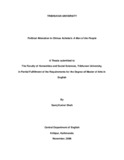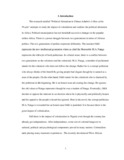Please use this identifier to cite or link to this item:
https://elibrary.tucl.edu.np/handle/123456789/1331| Title: | Political Alienation in Chinua Achebe's A Man of the People |
| Authors: | Shah, Saroj Kumar |
| Keywords: | Orientalism;Hegemony;Discourse;Decolonization |
| Issue Date: | 2008 |
| Publisher: | Department of English |
| Institute Name: | Central Department of English |
| Level: | Masters |
| Abstract: | Albert Chinualumogu Achebe, the finest Nigerian novelist of the 20th century, draws the lives and cultures of African people through his writing. He has set this novel, A Man of the People in the post-colonial period in an independent African country. In the novel, Achebe shows the social, political and psychological impact of European imperialism on indigenous African societies. Mainly, he has shown the political degradation in the African country where the irresponsibility and visionlessness of the leader leads the country into anarchy, chaos and violence rather than to progress and prosperity. Achebe has depicted the invasion of colonial remnants in an independent African homeland that leads the country to the political alienation. Though the empire leaves the country, the psychological components that ruin and rule still remains at the aftermath of colonialism. Through the narrator Odili and the political leader Nanga, Achebe shows the limited independent government in which there is neither collective will in the people nor responsible leadership to redeem the people and their culture. As a consequence, people are unfamiliar with their culture and they are forced to live in a new form of slavery, pessimism and degeneration. Rather than having optimistic perspectives towards the decolonized independent nations, the self-glorifying dictators and their poverty, which are the common images of the continents. |
| URI: | http://elibrary.tucl.edu.np/handle/123456789/1331 |
| Appears in Collections: | English |
Files in This Item:
| File | Description | Size | Format | |
|---|---|---|---|---|
| cover.pdf | 20.01 kB | Adobe PDF |  View/Open | |
| chapter(1).pdf | 199.96 kB | Adobe PDF |  View/Open |
Items in DSpace are protected by copyright, with all rights reserved, unless otherwise indicated.
